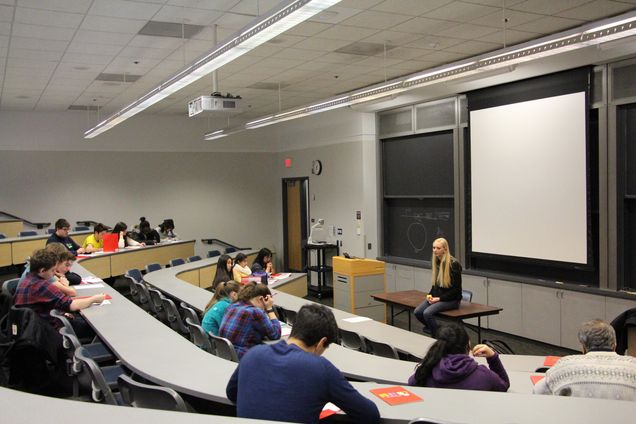Forging a New Path
New Outreach Initiative will Educate Community about Synthetic Biology
By Sara Cody

After a morning of composing DNA out of play dough and learning about genetically engineered mosquitos, the group of high school students put their heads together to solve an age-old question for Bostonians: how do we clean up the Charles River? Proposing solutions like programming microbes to eat toxins and simultaneously synthesize beneficial molecules, it was clear the group of students drew on everything they had learned earlier that day to find a solution using a relatively new field of study: synthetic biology, or engineering living systems.
When the National Science Foundation awarded the Living Computing Project, spearheaded by Associate Professor Douglas Densmore (ECE), a $10 million dollar grant to facilitate synthetic biology using computer engineering, one of the stipulations was an outreach component. The idea was to get research out into the community that is unfamiliar with the field of synthetic biology and foster a career readiness pipeline to the synthetic biology workforce. But Densmore wanted to take it even further than that.
“The NSF grant for the Living Computing Project has a five year research agenda, but we wanted to create an outreach program that would outlive it,” says Densmore. “STEM Pathways aims to formalize the outreach efforts and make it easier to funnel people to the right resources if they exist, and to create them if they don’t. Any individual has a low bandwidth working alone, but with a united effort, you can have a bigger impact.”
STEM Pathways held its inaugural launch event, the Mini-Jamboree, on Feb. 11 when high school students, parents, undergraduates and educators came together for a day of interactive activities to learn more about the field of synthetic biology and how it can be used to solve real-world problems, both globally and locally. According to Tiffany E. Grant, the program coordinator, this is the first of many events that STEM Pathways hopes to host for students of all ages.
“Events like the Mini-Jamboree will expose young people to this exciting new industry and show them how it can improve society,” says Grant. “Our four power words are ‘inspire, mentor, train and empower,’ and the vehicle of choice we are using to strengthen and inform our community is synthetic biology.”
STEM Pathways will follow a three-prong approach to begin a cycle of long-term exposure to the field of synthetic biology, starting with high school students. By providing opportunities to participate in synthetic biology-related activities and providing resources to educators to include in their curricula, awareness will begin at a much earlier age. Undergraduates will have the opportunity to participate in synthetic biology research, mentoring and other educational opportunities to prepare them for careers in the field. STEM Pathways will also tap industry leaders to establish partnerships for networking, career readiness development, and other resources.
“Not only is this initiative aligned with the mission statement of the College, but also it is addressing a national need to create a more diverse, informed workforce,” says Assistant Dean for Outreach and Diversity Gretchen Fougere. “Synthetic biology is a cutting-edge interdisciplinary field and to understand and develop this technology, it’s important to develop a long term plan that follows students from high school to college and beyond in order to strengthen the field and its potential.”
One of the flagship events for STEM Pathways for both high school and college students will be the iGEM Jamboree, the world’s premier synthetic biology competition for students that hosted more than 5,600 participants from 42 countries last year. Teams of students conduct research up until the competition, where they present their projects for prizes. Even though iGEM is based in Cambridge, there are no local high school students represented in the competition. While BU already has two undergraduate teams in place, Densmore wants to create an opportunity for local high school students to participate in the Jamboree as well, which will allow undergraduates to become mentors to younger students.
“The field of synthetic biology not only needs talented scientists but also more considerate citizens who have a deeper understanding of the field and the potential it has for innovation,” says Divya Israni, a graduate student in Assistant Professor Ahmad Khalil’s (BME) laboratory who serves as a team mentor for BU’s iGEM teams. “It’s an opportunity to open a connection to allow undergraduate students to affect the community outside of BU.”